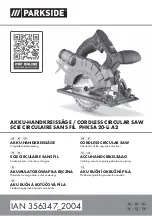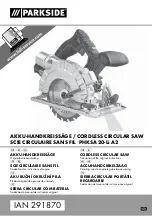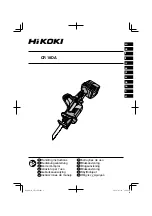
Motor:
120V~60Hz 5.5AMPS
No-load Speed:
500~3,000 SPM
Stroke:
0.94in.
Max. Cutting Capacity:
Wood - 4 1/2in. (115mm)
Steel - 0.4in. (10mm)
CETL Listed:
Technical Specifications:
A reciprocating saw is an electrical cutting tool that is used to cut drywall,
metals, plaster, tubing, wood and wood lath.
When unpacking the Reciprocating Saw, please check if any parts are missing
or broken. Please call Product Support at 1-800-222-5381.
Description
Specifications
Intended use:
Reciprocating Saw ............... ............... 1
Blade ............... ............... 2
Hex Key ............... ............... 1
Unpacking:
Thank you very much for choosing a Klutch
TM
product! For future reference,
please complete the owner's record below:
Model: _______________ Purchase Date: _______________
Save the receipt, warranty and these instructions. It is important that you read
the entire manual to become familiar with this product before you begin using it.
This machine is designed for certain applications only. The distributor cannot
be responsible for issues arising from modification. We strongly recommend
this machine is not modified and/or used for any application other than that for
which it was designed. If you have any questions relative to a particular application,
DO NOT use the machine until you have first contacted the distributor to
determine if it can or should be performed on the product.
For technical questions please call 1-800-222-5381.
General Safety Rules:
WARNING! Read and understand all instructions.
Failure to follow all
instructions listed below may result in electric shock, fire and/or serious injury.
WARNING! The warnings, cautions, and instructions discussed in
this instruction manual cannot cover all possible conditions or situa-
tions that could occur. It must be understood by the operator that
common sense and caution are factors which cannot be built into this
product, but must be supplied by the operator.
SAVE THESE INSTRUCTIONS
WORK AREA
• Keep work area clean,
free of clutter and well lit. Cluttered and dark work
areas can cause accidents.
• Do not use your tool where there is a risk of causing a fire or an
explosion;
e.g. in the presence of flammable liquids, gasses, or dust. Power
tools create sparks, which may ignite the dust or fumes.
• Keep children and bystanders
away while operating a power tool.
Distractions can cause you to lose control, so visitors should remain at a safe
distance from the work area.
• Be aware of all power lines, electrical circuits,
water pipes and other
mechanical hazards in your workarea, particularly those hazards below the
work surface hidden from the operator's view that may be unintentionally
contacted and may cause personal harm or property damage.
• Be alert of your surroundings.
Using power tools in confined work areas
may put you dangerously close to cutting tools and rotating parts.
ELECTRICAL SAFETY
WARNING!
Always check to ensure the power supply corresponds to the
voltage on the rating plate.
• Do not abuse the cord.
Never carry a portable tool by its power cord, or
yank tool or extension cords from the receptacle. Keep power and extension
cords away from heat, oil, sharp edges or moving parts. Replace damaged
cords immediately. Damaged cords may cause a fire and increase the risk of
electric shock.
• Grounded tools
must be plugged into an outlet properly installed and
grounded in accordance with all codes and ordinances. Never remove the
grounding prong or modify the plug in any way. Do not use any adapter plugs.
Check with a qualified electrician if you are in doubt as to whether the outlet is
properly grounded.
1
2
























